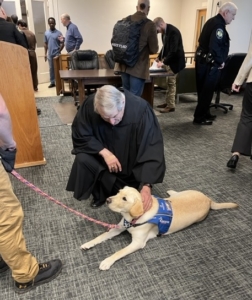Warrior Canine Connection’s Innovative Service Dog Training Program Celebrates 5-Year Milestone at Buncombe County Veterans Treatment Court
Veterans Train Service Dogs as Part of Their Own Recovery
 Warrior Canine Connection (WCC) is celebrating a milestone—five years since it has partnered with the Buncombe County Veterans Treatment Court (VTC) to provide service dog training as part of its community service options for Veteran participants.
Warrior Canine Connection (WCC) is celebrating a milestone—five years since it has partnered with the Buncombe County Veterans Treatment Court (VTC) to provide service dog training as part of its community service options for Veteran participants.
Veterans involved in the VTC programming are often required to complete a set number of community service hours. The dog training — offered through WCC — is one of the options on the docket. Training takes place on a weekly basis at the courthouse and Veterans can participate within the WCC program for the duration of their VTC commitment.
Judge Marvin Pope, who has presided over the program since its inception and is a dog lover himself, says he knows the powerful role dogs can play as a friend, companion and confidant.
“When Warrior Canine Connection became a possibility for Veteran Treatment Court, I knew that this was a unique opportunity to give our Veteran clients this “link” to something they may not have experienced before, plus bond them to a “personality” that is faithful, friendly, and most importantly “forgiving” no matter what the client may or may not have done in the past,” said Judge Pope. “I have seen this work so well for so many of our Veteran clients. I want to continue this relationship with Warrior Canine Connection and VTC forever.”
VTC participants learn to train service dogs for their fellow Warriors. In doing so, Veterans can also benefit from skills development in communication, confidence building, accountability, emotional regulation and patience to promote an act of service while receiving a therapeutic benefit. Since its inception, Veteran participants have logged more than 1,900 community service hours.
“I always looked forward to working with the dogs; learning how to train them,” shared one VTC graduate. “I like who I am when I get to be with the dogs. I think the dogs understood me even when I couldn’t understand myself. They helped me graduate from the VTC. I want to work with animals and give back.”
Amy Guidash, WCC Asheville program manager and liaison to the Buncombe County VTC Program, says the program has been successful because it focuses on impacting its Veteran participants.
“The Veterans participating have been able to make WCC part of their recovery plan,” said Guidash. “Many of our participants voluntarily continue with the program after completion, staying actively involved by devoting a couple hours per week to give back to their fellow Veterans.”
Kevin Rumley, coordinator for the Buncombe County VTC, has watched the program since it took shape five years ago and continues to be inspired by its impact on the Veterans involved.
“I am amazed by the work of WCC with our VTC veterans,” said Rumley. “Michele, Amy, Robin (WCC staff and volunteers) and the WCC dogs have supported our veterans through every step of the VTC journey. From Phase-1 veterans who are navigating a new life without substances/drugs and all the requirements of the court, to our graduating veterans who are setting future focused goals and working towards careers, WCC is providing the veterans with the skills of self/emotion regulation, behavior modification, and trauma resiliency. I am honored to celebrate five years of our partnership and look forward to another five years of advancing healing for our veterans. WCC saves lives!”


